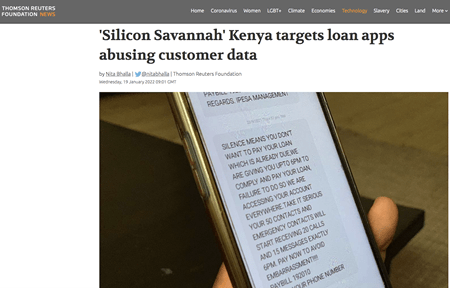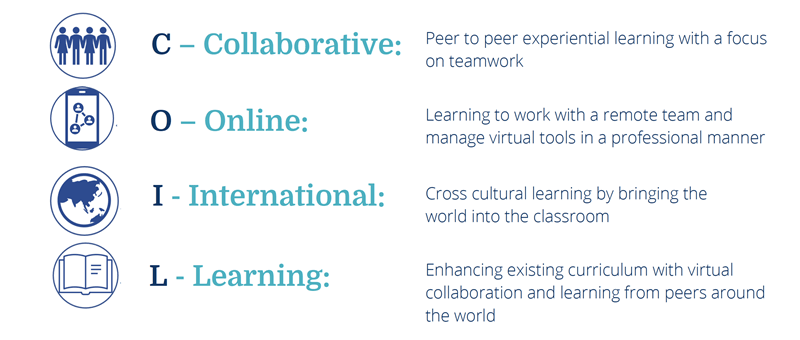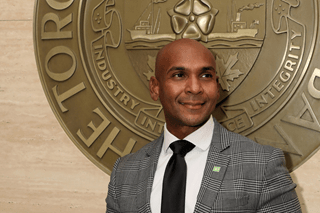
Collaborative Online International Learning helping PSB students see business from a global perspective
 by Jon Kuiperij – Sep 2, 2022
by Jon Kuiperij – Sep 2, 2022 Is it ethical for Canadian companies and consumers to take advantage of low labour costs in developing nations? How do European approaches to the stock market compare to North American strategies? What do companies in other countries prioritize when recruiting, selecting and training new employees?
Sheridan Pilon School of Business (PSB) students aren’t simply having discussions about these global topics — they’re having those discussions with peers around the world, many of whom have contrasting views based on their cultural and economic differences.
 For instance, Bachelor of Business Administration (BBA) - Accounting student Reshma Tahal was appalled when she first heard about the way mobile lenders in Kenya use artificial intelligence to assess the creditworthiness of applicants. “The process is simple and getting the loan is simple,” Tahal says of how smartphone applications comb through applicants’ personal data, including their contact lists, recent transactions, social media accounts and browsing history. “But the harassment that can come afterwards is ridiculous, like lenders messaging your family or your employer if you fall behind on your payments.”
For instance, Bachelor of Business Administration (BBA) - Accounting student Reshma Tahal was appalled when she first heard about the way mobile lenders in Kenya use artificial intelligence to assess the creditworthiness of applicants. “The process is simple and getting the loan is simple,” Tahal says of how smartphone applications comb through applicants’ personal data, including their contact lists, recent transactions, social media accounts and browsing history. “But the harassment that can come afterwards is ridiculous, like lenders messaging your family or your employer if you fall behind on your payments.”
However, Tahal quickly learned not everybody felt the same way — including one of her classmates, a Kenyan student who had successfully borrowed money using one of those very smartphone apps. “She was able to access a loan, she managed to repay it, and she’s in a much better position now,” says Tahal. “Even though I still feel like those apps are exploiting people, I now also realize that they can be helpful and that not everyone sees things the way that I do."
“Even though I still feel like those apps are exploiting people, I now also realize that they can be helpful and that not everyone sees things the way that I do.”
– BBA - Accounting student Reshma Tahal
Powerful learning experiences like this are made possible through PSB and other Sheridan faculties’ participation in Collaborative Online International Learning (COIL), a global program that allows students, faculty and staff to learn, discuss and collaborate with international institutions in an online classroom as part of their curriculum. Tahal and her BBA classmates worked with peers from Kenya’s Riara University as part of Wayland Chau’s Ethics, Sustainability and Corporate Responsibility course, while professors Mark Weaver (Quantitative Methods in Finance) and Dr. Sathy Sritharakumar (Human Resource Management) have also taught courses in collaboration with international partners.
“Rather than a painter sitting down at a canvas and sketching out what they want to paint,” says professor Stan Kamzol, PSB's Co-ordinator International Academic Exchange and a primary contact in the faculty's COIL initiatives, “COIL involves two professors showing up with two brushes and painting an experience — one that stimulates their students, connects the academic material and, most importantly, results in those students leaving the experience with a greater understanding of how a different culture thinks about issues.”
Ethics, Sustainability and Corporate Responsibility
Chau used COIL in both the fall and winter semesters of his upper-year BBA degree course last year, first partnering with Dr. Nikolina Fuduric at Switzerland’s University of Applied Sciences Northwestern Switzerland (FHNW) and then collaborating with Riara’s Zephania Opati. “The way ethics are applied can differ from person to person and from culture to culture, but the general theories of ethics and corporate social responsibility are universal,” Chau says.
During the four-week project with FHNW, Chau led an insightful discussion contrasting the stances Canadian and Swiss postsecondary institutions took on COVID-19 vaccines. “Canadian schools required that anyone coming onto campus must be vaccinated, while Swiss schools did not — even though their country’s COVID infection rates were higher,” Chau notes. “We quickly saw that Switzerland places a much higher priority on individual freedom than it does on collective initiatives.”
Chau then guided students from both schools through a game of Fishbanks, a multiplayer web-based simulation in which participants play the role of fishers looking to maximize their net worth. “Each team made decisions on how many ships to buy or sell, and where to send those ships to catch fish in international waters,” says Chau. “If you overfish, the fish start to disappear and then the value of your ships plummet, which illustrates the tragedy of the commons — how a shared resource can become depleted by individuals pursuing their own interests. It’s similar to the climate change issues we all face today.” Fuduric wrapped together the learning from the previous COIL class in a stimulating discussion of how systems thinking can be used to address sustainability issues in business.“There are ways to conduct your business while still being a good human being, not simply taking advantage of people who are less fortunate than you because you can.”
– BBA - Marketing Management student Shamelle Sutton
In the collaboration with Riara, Opati detailed the controversial way mobile loans are issued in Kenya, while Chau oversaw a debate about the ethics of offshore manufacturing. In both cases, Riara students often had opposing views from their PSB peers. “Kenyan students were generally quite comfortable with giving away their contacts and privacy to access loans, but that was a big no-no among Canadian students,” says Opati. “And while many Kenyans felt that offshore manufacturing is a valuable investment in their economy that provides people with jobs, a lot of Sheridan students didn’t think it was right for companies to do business in countries where they could take advantage of lower wages.”
Ultimately, PSB students learned to appreciate how business practices they might not necessarily agree with could still have value — as long as those practices were carried out ethically.
“Those loans can be a good thing for people who may not otherwise have access to funds, giving them a chance to elevate themselves. But we need to know more about what information these loan providers are collecting from applicants, and whether applicants are actually aware of what information is being collected and how that information is being used,” says BBA - Marketing Management student Shamelle Sutton. “There are ways to conduct your business while still being a good human being, not simply taking advantage of people who are less fortunate than you because you can. I’m not opposed to these loans or offshore manufacturing. I just think there’s a right way to do things.”
Quantitative Methods in Finance
Weaver was quick to recognize the value that COIL could bring to his finance students, embedding it into his Quantitative Methods in Finance BBA course during the Winter 2021 semester and then again this past year. “The vast majority of publicly-traded companies in Canada are export-minded,” he notes. “We have very few mid-sized or larger companies that are solely domestic-focused, so inevitably our students will all have to deal with that larger macro environment.”
During the first COIL experience, nearly 40 PSB students had an opportunity to work with peers from five European countries: the Netherlands (Saxion University of Applied Sciences), United Kingdom (University of Manchester), Germany (Fulda University of Applied Sciences), Romania (Lucian Blaga University of Sibiu) and India (Cambridge Institute of Technology and Farook Institute of Management Studies). Using cloud-based stock market simulation software Personal Finance Lab, participants exercised joint decision-making in an active and time-constrained international marketplace, then completed a reflective assignment that summarized their takeaways and learnings.
“It was fun to be able to look at the same playing field from different perspectives. The Manchester instructor was far more aggressive in her investing style than our conservative students were, and she encouraged them to try new things and learn what risk means,” Weaver says. “A big part of providing a quality learning experience is being current and allowing students to see new things and try new ideas. And a great way to try out new ideas is to match up with someone you’ve never met before and say, ‘Let’s go for it’.”“A big part of providing a quality learning experience is being current and allowing students to see new things and try new ideas. And a great way to try out new ideas is to match up with someone you’ve never met before.”
– BBA - Finance professor Mark Weaver
Weaver, who partnered with Saxion once again in the Winter 2022 semester, adds that the benefits of COIL extend far beyond the opportunity to see contrasting styles in action. “When you connect with people across the world and see how much you have in common, that can also be an ‘aha!’ moment,” he says. “You realize that you might take surprisingly similar approaches to resolving a problem — even if you’re in different countries with different values and dynamics.”
Human Resource Management
For BBA - Finance student Zaibunnissa Marfani, the opportunity to collaborate with Saxion students in Sritharakumar’s Human Resource Management class was like opening another door to her future.
“I already know a lot of people in many different countries,” says Marfani, who was born in Pakistan, moved to Kenya at the age of eight and has friends who are studying abroad in Australia, the UK and the U.S. “But the more exposure you get to different cultures, the more confident you become and the more options you have when it comes to finding a job.”
Especially if you understand what different cultures prioritize in their hiring processes — something Marfani cites as her biggest takeaway from a recruitment and selection breakout room exercise with Dutch students. “I came to realize that if I was a software engineer applying for a job in the Netherlands and wrote my resume from a Canadian perspective, I would not make it. Canadians were very particular about experience and education, but the Dutch were just looking for a little bit of experience and weren’t insistent on a specific education or set of skills,” she says.
“I also learned that even though the Dutch have a shortage of people with technical skills, they are hesitant to hire international applicants because of concerns about language barriers. There’s obviously a bias to that, but I thought it was awesome that their students recognized it and knew it was wrong — which can lead to change in the future.”
In another exercise, students from both countries reviewed a case study about a female executive’s application for a job in Japan, and analyzed why her application was unsuccessful.“If you can intermingle EDI with human resources in a student's education, it easily gets in their head and stays there, becoming part of their life and part of their thought process.”
– BBA - Human Resources professor Dr. Sathy Sritharakumar
“Students from the Netherlands spoke about giving more opportunity for women to rise within organizations and focusing on talent, which is something we try to highlight on our side as well,” says Sritharakumar, who was also struck by the Europeans’ encouragement of independent approaches.
“You can hypothetically talk about many things and make rules and regulations, but things never change that way. If you can intermingle equity, diversity and inclusion (EDI) with human resources in a student’s education, it easily gets into their head and stays there, becoming part of their life and part of their thought process.”
COIL could become part of all business programs
The use of COIL in PSB and other faculties will only grow in the future as a key part of Sheridan’s Internationalization and Global Connectivity Strategy, which aims to develop critical global citizens and changemakers who have the mindset, fluency and outlook to actively engage and positively impact their local and international communities.
 After featuring COIL in three programs in 2020-21, Sheridan added seven new COIL experiences this past year through funding from Global Skills Opportunity, a federal outbound student mobility program that also helped Sheridan develop online resources and a module that supports cross-cultural communication for COIL participants. “The Global Skills Opportunity has been an incredible catalyst, enabling teams across Sheridan to engage in meaningful collaboration to facilitate innovative digital transformations infused with and empowered by focuses on EDI and sustainability,” says Dr. Amira El Masri, Director of Sheridan’s Centre for Global Education and Internationalization.
After featuring COIL in three programs in 2020-21, Sheridan added seven new COIL experiences this past year through funding from Global Skills Opportunity, a federal outbound student mobility program that also helped Sheridan develop online resources and a module that supports cross-cultural communication for COIL participants. “The Global Skills Opportunity has been an incredible catalyst, enabling teams across Sheridan to engage in meaningful collaboration to facilitate innovative digital transformations infused with and empowered by focuses on EDI and sustainability,” says Dr. Amira El Masri, Director of Sheridan’s Centre for Global Education and Internationalization.Three courses in the Faculty of Humanities and Social Sciences (Creative City & Culture; Language, Learning and Culture; and Canadian Politics) and two in the Faculty of Animation, Arts & Design (Interaction Design; and Digital Solutions Journalism) have also used COIL in the past two years, and the Faculty of Applied Science and Technology plans to introduce its first COIL project in the Winter 2023 semester. Meanwhile, PSB’s ultimate goal is to feature COIL in multiple courses of all five of its BBA specializations and eventually add it to diplomas and certificates as well.“COIL is the way for students, faculty and institutions to go... It creates students who are able to relate to people around the globe.”
– Riara University professor Zephania Opati
“The world’s been quite disturbed. Rather than cocooning, we should be stimulated and encouraged to think more and more out of the box, to think in terms of novelty, to openly recognize that our classrooms are multi-cultural,” says Kamzol. “COIL is an opportunity to swim in the pool a bit. Not just visit the pool and then leave, but to actually get involved.”
In addition to providing a taste of international learning for students interested in participating in a study abroad or student exchange program, COIL also breaks down barriers to international learning for those who aren’t able to physically relocate across the world. “There’s no additional cost involved. No one has to get onto a flight and live in a different place for three or four months. They just have to sign in online, like they would for any other online class,” Chau says. Adds Tahal: “Studying abroad is something that I’ve considered before, but time and money were some of the factors that kept me from doing it. It was really beautiful that we were able to get the best of both worlds — it was almost like traveling, but without leaving my house.”
Faculty and students across the world who have learned collaboratively with PSB feel the same way.
“I think COIL is the way for students, faculty and institutions to go. It provides interactive opportunities that expose our students to more learning and different ideas, and it creates students who are able to relate to people around the globe,” Opati says.
“I saw so much participation and interest from our students, more than in any other class I’ve ever taught.”
Media Contact
For media inquiries, contact Sheridan’s Communications and Public Relations team.





